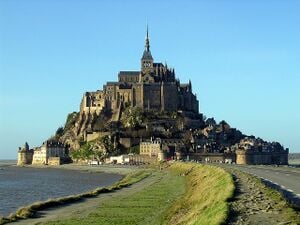
The aim of this page is to recognise, celebrate and encourage the self-empowerment of community agency networks (CANs) and community groups' activism for climate, environment and many other sustainability topics across France.
 Paris to showcase what a real bicycle city looks like during Summer Olympics, momentummag.com (Mar 13, 2024)
Paris to showcase what a real bicycle city looks like during Summer Olympics, momentummag.com (Mar 13, 2024)  Why Europe is dismantling its dams, BBC Future (Mar 05, 2024)
Why Europe is dismantling its dams, BBC Future (Mar 05, 2024)  France halts €100-a-month electric car leasing scheme after huge demand, theguardian.com (Feb 14, 2024)
France halts €100-a-month electric car leasing scheme after huge demand, theguardian.com (Feb 14, 2024)
More video: Grand Designs, Brittany Groundhouse, Channel 4, 26 Feb 2009
Networks and sustainability initiatives[edit | edit source]
- Grenoble European Green Capital 2022, added 14:21, 19 October 2021 (UTC)
- Transition France
- Pays d'Arles en Transition
- 'Essential Guide to Doing Transition' in French
- Nantes Green Capital - Nantes 2013, European Green Capital
Bioregionalism[edit | edit source]
- Atelier LUMA, Arles, France
Climate action[edit | edit source]
- Citizens Climate Convention
- Version française du site internet de la CCNUCC (United Nations Framework Convention on Climate Change)

Open spaces[edit | edit source]
Community involvement[edit | edit source]
Wikipédia: Commission nationale du débat public
Communities online[edit | edit source]
Community currencies activism[edit | edit source]
SoNantes, complementary currency, Nantes region.
Community energy[edit | edit source]
Ekopedia: Propositions énergétiques pour la France
Food activism[edit | edit source]
- Refugee Community Kitchen, serves hot, nourishing meals to displaced people in the UK and France, added 16:27, 13 April 2021 (UTC)
Creating a vibrant local food ecosystem through government-NGO collaboration
Up until a few years ago, the residents of Loos-en-Gohelle, a small town in rural northwestern France with over 6,000 residents, consumed imported industrial food products despite significant local production. In addition to the negative health impacts of their diet, this practice also hurt the local economy. In 2013, the town government of Loos-en-Gohelle started a project called VITAL as part of an ambitious program to improve the diets of Loos-en-Gohelle residents.
The project was built on an existing initiative called Anges Gardins, run by a local association that has worked on community gardens and food education for years. It is also part of a long-term, comprehensive transition to a diverse, sustainable local economy from one dependent on coal mining — an industry that vanished when the French government closed the region's coal mines in 1990, in favor of cheaper imports. Food is viewed as a cross-cutting issue, capable of supporting transition in other sectors.
The policy has a two-pronged strategy to meet the goal. First, to stimulate the demand for local, organic food through education, gardening ambassadors, free produce from open food gardens, and more. The town government led by example, by shifting to 100 percent organic food procurement for schools and 15 percent for retirement homes.
Second, to encourage farmers to convert to organic farming and support food distribution. To help achieve this, the town offered farmers free access to land on the condition that they grow organically and that they convert some of their own existing agricultural land to organic as well, thus raising the share of lands grown organically to 10 percent. Terre d'Opale, another local association, coordinates the farmers to ensure diversity of local production and manage distribution. Distribution is handled weekly through a combination of an online store, delivery of food boxes to local collection points, and procurement through catering businesses.
The program has operated successfully for three years. As the program benefits the entire local food ecosystem, including consumers, farmers, food kitchens, and distributors, it continues to grow and serve more and more of the community.[1]
Other initiatives
Archives de Cuisson Solaire - Incredible Edible Fréland - La Ruche qui dit Oui ! - Open Food France - Solar cooking resources in France
Networks: Les Incroyables Comestibles
Ekopedia: Association Végétarienne de France
Reduce, reuse, repair and recycle[edit | edit source]
Zero Waste Challenge, Roubaix
With an annual average of 243 kg (over 535 pounds) of waste per capita, citizens of Roubaix, in the north of France, were producing less than half their country's average Municipal Solid Waste (MSW). Yet their aim to reduce it even further has brought about the Zero Waste Challenge.
Despite having no executive power on separate collection and other waste-related activities, the city has started a program to lead the zero waste movement in France. The initiative challenges around one hundred volunteer families to reduce the amount of solid waste produced at household level by 50 percent over the course of a year. Offering support through an array of events like workshops, coaching initiatives, and other activities such as food exchanges, the program gives no directions — only suggestions. Interestingly, the program bypasses any intermediaries, therefore creating a direct channel between the city and the families taking part.
After the first year, results were more than encouraging, with 70 percent of participating families having reduced their waste production by around 40 percent, while 25 percent of them had achieved an 80 percent reduction. The policy is now also replicated to target other actors such as public offices, four schools, and shopkeepers in the urban area of Roubaix.[2]
Sustainable transport[edit | edit source]
Trams in France
Since the opening of the Nantes tramway in 1985, more than twenty towns and cities across France have built new tram lines. As of 2020, there are 29 operational tram networks in France, with 3 more planned. W
One line is planned to open in Annecy. W
Waterways and Canals
The French natural and man-made waterways network is the largest in Europe extending to over 8,500 kilometres (5,300 mi) of which (VNF, English: Navigable Waterways of France), the French navigation authority, manages the navigable sections. Some of the navigable rivers include the Loire, Seine and Rhône. The assets managed by VNF comprise 6,700 kilometres (4,200 mi) of waterways, made up of 3,800 kilometres (2,400 mi) of canals and 2,900 kilometres (1,800 mi) of navigable rivers, 494 dams, 1595 locks, 74 navigable aqueducts, 65 reservoirs, 35 tunnels and a land area of 800 km2 (310 sq mi). Two significant waterways not under VNF's control are the navigable sections of the River Somme and the Brittany Canals, which are both under local management.
Approximately 20% of the network is suitable for commercial boats of over 1000 tonnes and the VNF has an ongoing programme of maintenance and modernisation to increase depth of waterways, widths of locks and headroom under bridges to support France's strategy of encouraging freight onto water. W
Citizens data initiative[edit | edit source]
- keolis-rennes.com, open data, Rennes
- open data 71, le Département de Saône-et-Loire libère ses données
Maps[edit | edit source]
Apps for sustainability[edit | edit source]
City Gardens, maps over 400 green spaces in Paris and has expanded to provide similar services to the French cities of Metz, Lille, Lyon, Montpellier, Strasbourg and the European Green Capital of 2013, Nantes.[3]
About France[edit | edit source]
France, officially the French Republic, is a country located primarily in Western Europe. Its overseas regions and territories include French Guiana in South America, Saint Pierre and Miquelon in the North Atlantic, the French West Indies, and many islands in Oceania and the Indian Ocean, giving it one of the largest discontiguous exclusive economic zones in the world. Metropolitan France shares borders with Belgium and Luxembourg to the north, Germany to the northeast, Switzerland to the east, Italy and Monaco to the southeast, Andorra and Spain to the south, and a maritime border with the United Kingdom to the northwest. Its metropolitan area extends from the Rhine to the Atlantic Ocean and from the Mediterranean Sea to the English Channel and the North Sea. Its eighteen integral regions (five of which are overseas) span a combined area of 643,801 km2 (248,573 sq mi) and have a total population of 68.4 million as of January 2024. France is a semi-presidential republic with its capital in Paris, the country's largest city and main cultural and commercial centre.
Metropolitan France was settled during the Iron Age by Celtic tribes known as Gauls before Rome annexed the area in 51 BC, leading to a distinct Gallo-Roman culture. In the Early Middle Ages, the Franks formed the Kingdom of Francia, which became the heartland of the Carolingian Empire. The Treaty of Verdun of 843 partitioned the empire, with West Francia evolving into the Kingdom of France. In the High Middle Ages, France was a powerful but decentralized feudal kingdom, but from the mid-14th to the mid-15th centuries, France was plunged into a dynastic conflict with England known as the Hundred Years' War. In the 16th century, the French Renaissance saw culture flourish and a French colonial empire rise. Internally, France was dominated by the conflict with the House of Habsburg and the French Wars of Religion between Catholics and Huguenots. France was successful in the Thirty Years' War and further increased its influence during the reign of Louis XIV.
France was one of the first countries to create an environment ministry, in 1971. According to the 2012 Environmental Performance Index conducted by Yale and Columbia, France was the sixth-most environmentally conscious country in the world, one place higher than the previous report in 2010.[4]
Near you[edit | edit source]
External links
- France, Environment, Haute Qualité Environnementale
- Ekopedia, French / Français
References
- ↑ Shareable, Nov 8, 2018
- ↑ Shareable, Feb 14, 2019
- ↑ European Green Capital
- ↑ wikipedia:France#Environment









